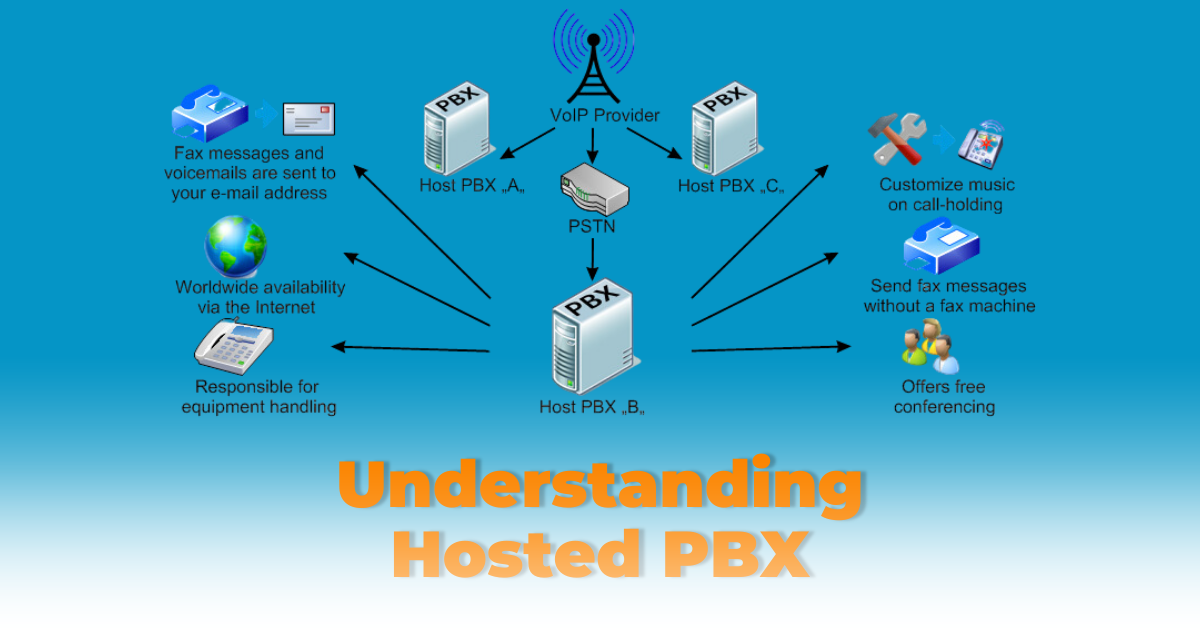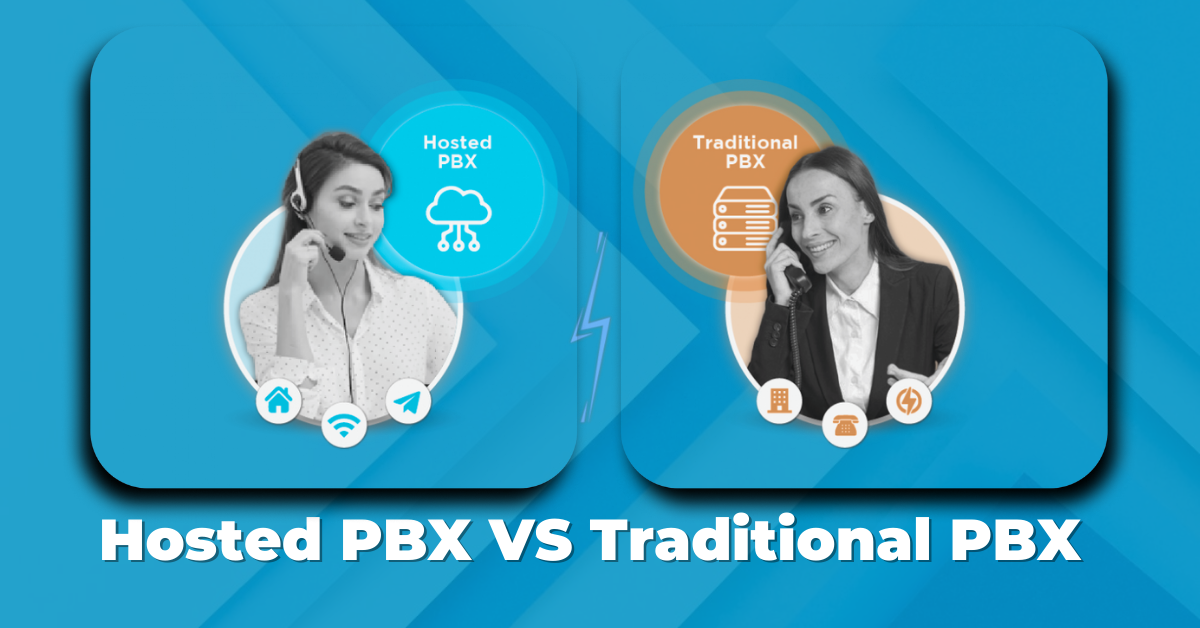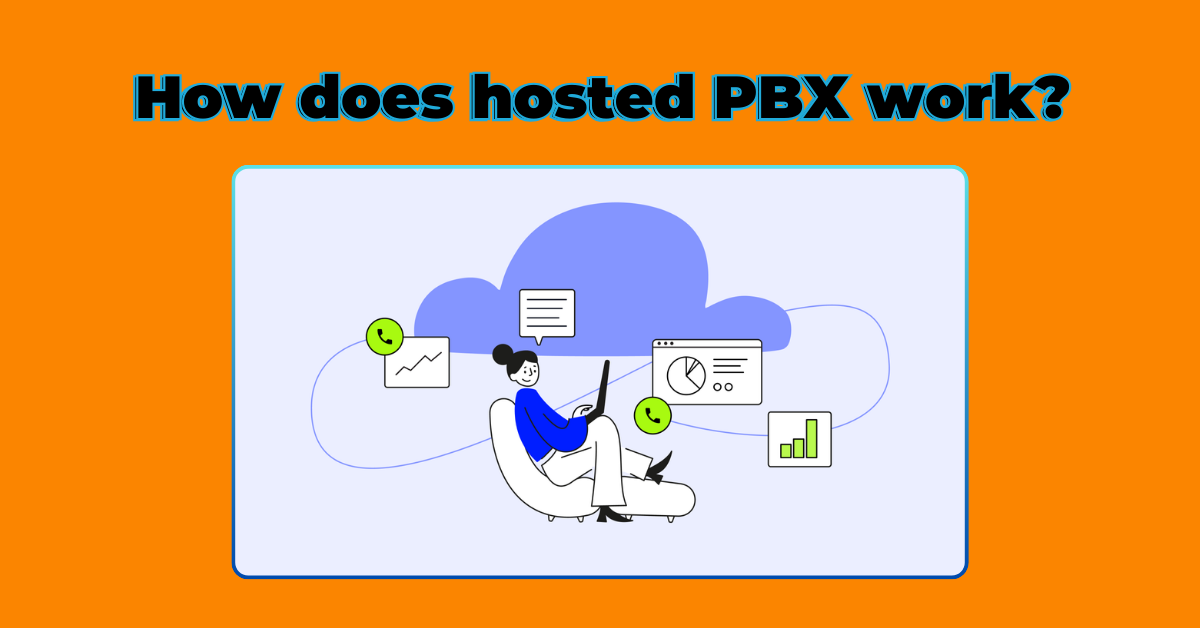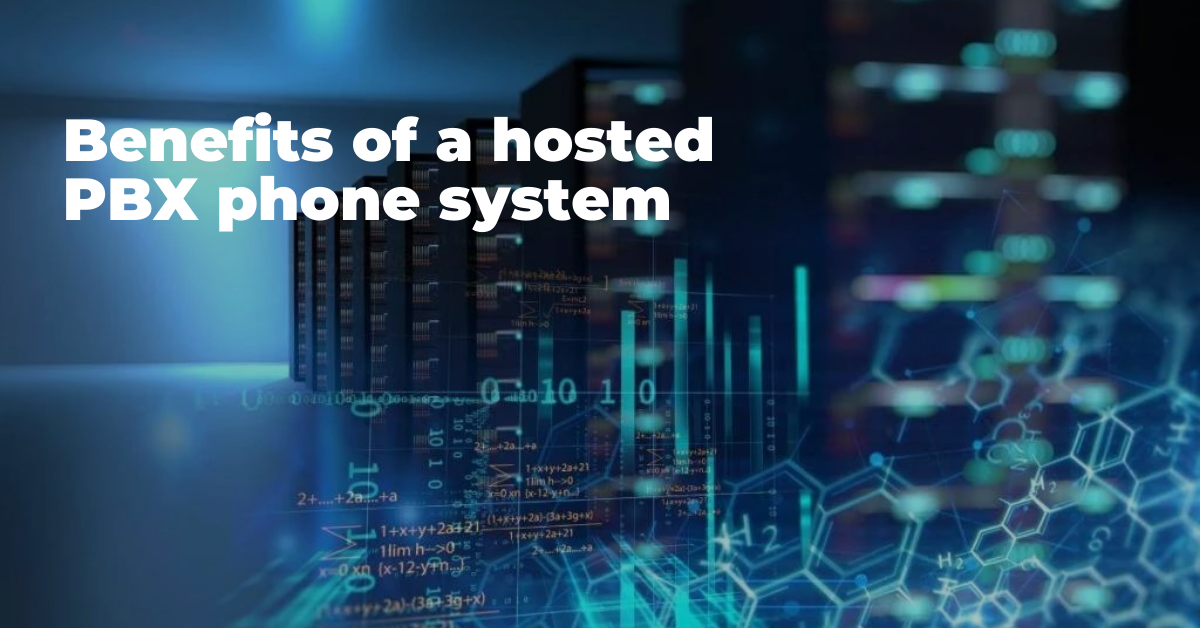Hosted PBX, a private branch exchange (PBX), is a telecommunications system managed and operated by a service provider. Unlike traditional PBX systems, which rely on copper wires and landline phones, hosted PBX utilizes the internet for making and receiving phone calls.
Businesses opt for hosted PBX, or transition from traditional PBX setups, for various reasons. Cost efficiency, access to advanced telecommunications features, and the desire to streamline workforce communication are among the primary motivations.
For businesses exploring telecommunications solutions, hosted PBX presents a compelling option. This guide covers everything you need to know about hosted PBX systems, including their functionality, benefits, and reasons why they may be the right choice for your business.
Understanding Hosted PBX

Being kept online and separate from the physical location of the business, a hosted PBX—basically, a cloud-based phone system—requires less maintenance and saves money.
The word “private branch exchange,” or “PBX,” refers to the system that allows calls to be transferred between lines inside of a company. Telephone operators handled and switched lines by hand to route calls to the appropriate people when the industry first began with analog PBXs.
The name IP PBX comes from the fact that the function is now online. Furthermore, cloud PBX, virtual PBX, and hosted IP PBX are terms that are commonly used to describe cloud-based PBX.
Not having to pay for maintenance, software, hardware, or training. With little installation costs, a hosted private branch exchange phone system is completely managed off-site.
Because of these advantages, more businesses are selecting cloud PBX service providers as their economical and practical office phone service provider. We will discuss additional benefits of cloud-based PBX services later in this article.
Traditional PBX vs hosted PBX

On-premises PBX and analog PBX are other names for traditional PBX systems. These PBX systems are operated by on-site software that is placed at your company’s office, together with physical hardware like copper telephone wires.
Your on-site PBX establishes a connection between your landline and the Public Switched Telephone Network (PSTN) when you place a call. The Plain Old Telephone Service (POTS) is another name for that system.
Hosted PBX uses VoIP technology to transmit voice traffic over the internet. Instead of using standard desk phones with separate extensions, businesses that use hosted PBX for their communication systems typically employ VoIP phones, also known as IP phones or softphones.
Instead of using copper cables and the PSTN, the hosted PBX infrastructure is fully maintained by the service provider and is connected to the internet.
Here are some of the key differences between on-premises traditional PBX and hosted PBX:
| Traditional PBX | Hosted PBX |
| On-premises hardware and software | Infrastructure managed by provider via internet |
| Relies on copper wires and PSTN (POTS) | Relies on internet connectivity |
| High initial set-up costs | Minimal set-up costs |
| Requires on-site IT staff | Provider handles maintenance |
| Expensive to scale | Easy scalability |
| More control over PBX system | Hand over control to service provider |
| Basic calling features | Additional features like IVR and ACD included |
This comparison clearly outlines the distinctions between traditional PBX and hosted PBX systems, highlighting their respective characteristics and advantages.
How Does Hosted PBX Work?

Hosted PBX (Private Branch Exchange) operates on the principle of utilizing internet protocol (IP) for communication, enabling organizations to manage their phone systems virtually through a service provider. Unlike traditional PBX systems that rely on physical hardware and copper wires, hosted PBX leverages the internet to transmit voice data, offering a more flexible and cost-effective solution for modern businesses.
At its core, hosted PBX works by routing calls over the internet rather than traditional phone lines. When a call is initiated, it travels through the organization’s internet connection to the service provider’s data center, where the call processing occurs. This data center houses the necessary hardware and software infrastructure to manage the entire PBX system efficiently.
Here’s a Breakdown of How Hosted PBX Operates:
- Initiating a Call: When a user dials a phone number, the signal is converted into digital data packets and transmitted over the internet to the hosted PBX provider’s data center.
- Call Processing: At the data center, the call is received and processed by the hosted PBX software. This software manages various call features, such as call routing, voicemail, call forwarding, and call recording.
- Routing the Call: Based on predefined rules or configurations set by the organization, the hosted PBX system routes the call to the intended recipient. This can include routing calls to specific extensions, departments, or even external numbers.
- VoIP Technology: Hosted PBX systems often utilize Voice over Internet Protocol (VoIP) technology to transmit voice data efficiently over the Internet. VoIP converts analog voice signals into digital data packets, ensuring clear and reliable voice communication.
- Accessibility: Hosted PBX systems offer accessibility from anywhere with an internet connection. Employees can make and receive calls using desk phones, softphones (software-based phones), or mobile apps, providing flexibility for remote and mobile workers.
Benefits of a hosted PBX phone system

Hosted PBX is replacing traditional on-premises PBX in an increasing number of enterprises.
Here are the main advantages of hosted PBX that motivate companies to switch and startups to choose a hosted PBX solution over a traditional PBX for their telecoms right away, from cost savings to enhanced flexibility:
- Cost Savings: Because there is no need to invest in costly hardware or infrastructure, hosted PBX systems usually have lower upfront costs than traditional PBX systems. Since the service provider handles upkeep and improvements, businesses can also save money on these expenses.
- Scalability: Businesses may simply add or remove phone lines and functions as needed with hosted PBX systems because of their excellent scalability. They are perfect for companies of all sizes, from little startups to huge conglomerates, due to their scalability.
- Flexibility and Mobility: With a hosted PBX system, employees can make and receive calls from anywhere with an internet connection. This flexibility is especially beneficial for remote or mobile workers who need to stay connected while on the go. Additionally, features like call forwarding and find me/follow me ensure that calls are never missed, regardless of the employee’s location.
- Advanced Features: Hosted PBX systems offer a wide range of advanced features that can improve productivity and enhance communication within the organization. These features may include auto-attendants, voicemail-to-email transcription, call recording, conferencing, and integration with other business applications such as CRM systems.
- Reliability and Redundancy: Hosted PBX systems are typically hosted in secure data centers with redundant infrastructure, ensuring high availability and reliability. This means businesses can rely on the service to maintain uninterrupted communication even in the event of a power outage or natural disaster.
- Easy Management and Maintenance: Since the PBX system is hosted in the cloud, the service provider is responsible for managing and maintaining the infrastructure. This frees up IT resources within the organization and allows them to focus on other strategic initiatives rather than managing a complex phone system.
- Professional Image: A hosted PBX system can help businesses project a professional image to customers and clients. Features like virtual receptionists and customized greetings can give the impression of a larger, more established organization, even for small businesses.
Overall, a hosted PBX phone system offers cost-effective, flexible, and feature-rich communication solutions that can help businesses improve efficiency, productivity, and customer satisfaction.
Is Hosted PBX Right for Your Business?

Determining whether a hosted PBX system is right for your business depends on various factors, including your company’s size, budget, communication needs, and future growth plans.
Some considerations to help you decide:
- Size of the Business: Hosted PBX systems are suitable for businesses of all sizes, from small startups to large enterprises. Small businesses often benefit from the low upfront costs and scalability of hosted PBX, while larger organizations appreciate the flexibility and advanced features.
- Budget: Consider your budget constraints and the total cost of ownership. Hosted PBX systems typically have lower upfront costs compared to on-premises solutions, as there’s no need to invest in expensive hardware or infrastructure. However, evaluate the ongoing monthly service fees to ensure they align with your budget.
- Scalability: If your business is rapidly growing or experiences fluctuating call volumes, a hosted PBX system’s scalability may be advantageous. It allows you to easily add or remove phone lines and features as needed without significant upfront investment.
- Remote Workforce: If your business has remote or mobile workers who need to stay connected from anywhere, a hosted PBX system’s flexibility and mobility features can be beneficial. Employees can make and receive calls using their mobile devices or laptops, enhancing productivity and collaboration.
- Advanced Features: Assess your communication needs and whether the hosted PBX system offers the features and functionality required to meet them. Features like auto-attendants, call routing, conferencing, voicemail-to-email, and integration with other business applications can improve efficiency and customer service.
- Reliability and Support: Consider the reliability and uptime guarantees provided by the hosted PBX service provider. Look for a provider with a proven track record of reliability and excellent customer support to ensure uninterrupted communication for your business.
- Security and Compliance: Ensure that the hosted PBX system complies with industry regulations and standards regarding data security and privacy, especially if you handle sensitive information or operate in regulated industries.
Conduct a thorough assessment of your needs and compare different service providers to determine if hosted PBX is the right solution for your business.
Future Trends and Innovations

Future trends and innovations in PBX systems and business communication are likely to be driven by advancements in technology and evolving customer expectations. Here are some potential trends to watch for:
- Artificial Intelligence (AI) Integration: AI-powered features, such as virtual assistants and chatbots, are likely to become more prevalent in PBX systems. These AI assistants can handle routine inquiries, schedule appointments, and provide personalized assistance to callers, improving efficiency and customer satisfaction.
- Unified Communications as a Service (UCaaS): The integration of various communication channels, including voice, video, messaging, and collaboration tools, into a single unified platform is expected to gain traction. UCaaS solutions offer seamless communication and collaboration experiences for employees, regardless of their location or device.
- 5G Connectivity: The widespread adoption of 5G technology will enable faster and more reliable internet connectivity, facilitating the use of bandwidth-intensive applications such as HD video conferencing and real-time collaboration tools within PBX systems.
- Internet of Things (IoT) Integration: Integration with IoT devices and sensors can enhance the functionality of PBX systems, enabling automated communication processes and data-driven insights. For example, IoT-enabled sensors could trigger alerts or notifications that are routed through the PBX system to relevant stakeholders.
- Blockchain for Security: Blockchain technology has the potential to improve the security and privacy of communications within PBX systems. By leveraging blockchain for authentication, encryption, and secure data storage, businesses can mitigate the risk of unauthorized access and data breaches.
- Customizable APIs and Integrations: PBX systems that offer open APIs and seamless integrations with third-party applications will continue to be in demand. This allows businesses to customize their communication workflows and integrate PBX functionality with other business-critical systems, such as CRM software and helpdesk platforms.
- Voice Analytics and Insights: Advanced analytics capabilities integrated into PBX systems can provide valuable insights into customer interactions and call performance. By analyzing call recordings, sentiment analysis, and call metrics, businesses can identify trends,
Wrapping Up
A PBX business phone system can be equipped with many different features and functions, such as:
You can easily communicate with staff members and provide consumers with a self-service option to obtain the information they require when they call you by using our multi-level auto attendant.
You may connect, unite your staff, and access all the capabilities your organization needs with PBX. To learn how to improve your business communications right now, contact us .


